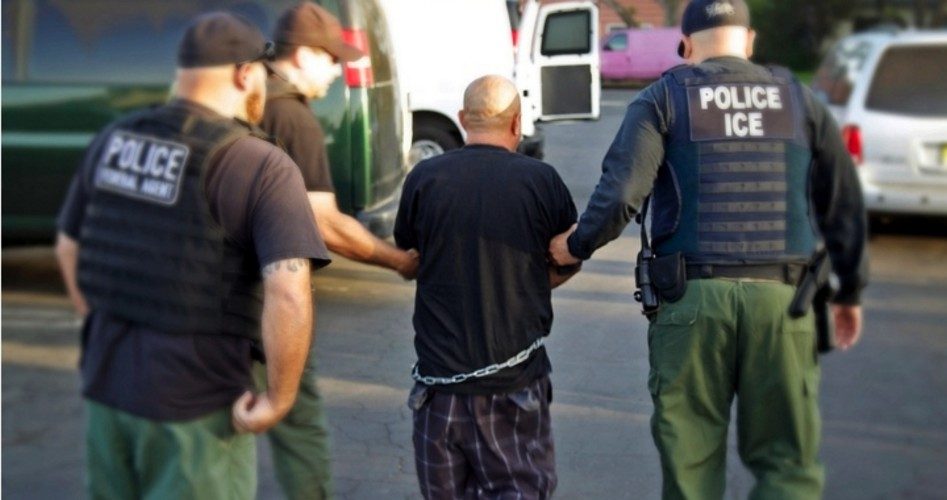
Speaking on February 25 at a town hall event on immigration, President Obama declared that there would be “consequences” if Immigration and Customs Enforcement (ICE) employees do not follow administration policy on deportation. The event was held at Florida International University in Miami, and moderated by José Díaz-Balart on MSNBC.
When Díaz-Balart asked Obama how he could ensure that ICE or Border Patrol agents would not deport illegal immigrants who were in the middle of legalizing their status when the Obama amnesty program was blocked by a court decision, the president replied:
José, look, the bottom line is, is that if somebody is working for ICE and there is a policy and they don’t follow the policy, there are going to be consequences to it. So I can’t speak to a specific problem. What I can talk about is what’s true in the government, generally.
In the U.S. military, when you get an order, you’re expected to follow it. It doesn’t mean that everybody follows the order. If they don’t, they’ve got a problem. And the same is going to be true with respect to the policies that we’re putting forward.
Obama announced his intention to pursue the policy under dispute in a televised national address last November 20. Since the House of Representatives had repeatedly refused to consider the bipartisan “Gang of Eight” immigration bill passed by the Senate in 2013 because it granted amnesty to many illegal aliens, Obama decided to implement facets of that failed legislation unilaterally though executive actions. He said in his address:
Now, I continue to believe that the best way to solve this problem is by working together to pass that kind of common sense law. But until that happens, there are actions I have the legal authority to take as president.
Outlining his plan to defer deportation for millions of “undocumented” (i.e., illegal) aliens. Obama said:
If you’ve been in America for more than five years; if you have children who are American citizens or legal residents; if you register, pass a criminal background check, and you’re willing to pay your fair share of taxes — you’ll be able to apply to stay in this country temporarily, without fear of deportation.
The actual policy of delaying deportation, however, was issued in a memorandum from Department of Homeland Security (DHS) Secretary Jeh Johnson, the subject of which was “Exercising Prosecutorial Discretion With Respect to Individuals Who Came to the United States as Children and With Respect to Certain Individuals Who Are the Parents of U.S. Citizens or Permanent Residents.”
Johnson’s memorandum, sent to the heads of U.S. Citizenship and Immigration Services, U.S. Immigration and Customs Enforcement; and U.S. Customs and Border Protection, expanded DACA (Deferred Action for Childhood Arrivals, which was initiated in 2012 by a policy memorandum sent from former DHS Secretary Janet Napolitano) by removing its age cap and extending work authorization to three years. The order also expanded “deferred action” (another name for amnesty).
The Homeland Security Department had planned to begin accepting the first applications under the new amnesty program on February 18, but those plans were placed on hold after U.S. District Judge Andrew S. Hanen of the U.S. District Court for the Southern District of Texas in Brownsville issued an order of temporary injunction on February 16 blocking the federal government from implementing the Obama immigration’s use of executive actions to grant amnesty to four million illegal aliens.
The administration has appealed that decision, but it is impossible to tell when that appeal will be heard or whether it will be upheld or rejected. On February 25, Hanen rejected the White House request that he lift his own injunction on the administration’s executive memorandum policies, and is giving the coalition of 26 states that sued to stop implementation of the amnesty program until next week to respond to the administration’s emergency motion.
When Díaz-Balart asked Obama what his plan was to move his plan forward, now that a federal judge had blocked it, the president answered:
Well, José, we’ve got one judge who made this decision. We appeal it to a higher court. We believe that the law is clearly on our side. This is true in everything that we do.
In answer to a follow-up question about how long the appeals process would take, Obama said:
The next step is to go to a higher court, the Fifth Circuit. That will take a couple of months for us to file that and argue that before the Fifth Circuit. We expect to win in the Fifth Circuit, and if we don’t, then we’ll take it up from there.
At another point, Obama defended his authority to disregard the implementation of existing immigration law through “prosecutorial discretion”:
If, in fact, we were completely just rewriting the immigration laws, then actually the other side would have a case, because we can’t violate statutes. We can’t violate laws that are already in place. What we can do is make choices to implement those laws. That’s what we’ve done with DACA and that’s what we’ve proposed with the expansion of DACA and DAPA.
Article II, Section 3 of the Constitution states that the president “shall take care that laws be faithfully executed,” but does not state that the president may “make choices” regarding which laws to execute (or implement).
It seems that Obama has changed his mind since Diaz-Balart asked him during a Telemundo network in September 2013 if he would “consider unilaterally freezing deportations for the parents of deferred action kids” (“DREAMers)” — those who came to the United States illegally as young children.
Obama replied, at the time:
My job in the executive branch is supposed to be to carry out the laws that are passed….
But if we start broadening that, then, essentially, I would be ignoring the law. In a way that I think would be very difficult to defend legally. So that’s not an option. I do get a little worried that advocates of immigration reform start losing heart and immediately think that some how there’s an out here: If the Congress doesn’t act, we’ll just have the president sign something and that will take care of it, we won’t have to worry about it. [Emphasis added.]
The president’s remarks during last November’s address, the interview at the recent town hall meeting, and on several occasions in between indicate that he has abandoned whatever respect for the Constitution’s separation of powers and the “take care” clause that he may have once had.
Related articles:
Federal Judge Stops Obama Executive Action Amnesty
More States Suing Feds Over Immigration Executive Orders
States Sue Obama Administration Over Executive Order on Immigration
Obama and Republicans Spar Over Immigration Executive Action Plans
Obama Will Use Executive Action to “Spur” Congress on Immigration Reform
Obama Pursues Plan to Implement “Immigration Reform” Unilaterally



